Column One: Alone in the U.S., an immigrant has one dying wish: To reunite with his estranged family
The sun had set on a cold winter day when two men from Mexicoâs civil protection agency knocked on Cecilia Rebeca Chavezâs door.
They brought news about her husband, Eduardo Hernandez, whom she hadnât heard from in 10 years. He was in California â and he was dying. The men left a phone number for her to call.
She learned that her husband had colon cancer; agonizing pain had driven Hernandez, a 60-year-old day laborer, to Huntington Hospital in Pasadena. He had days to live.
The agentsâ unexpected visit had unraveled at least part of a mystery for Chavez. Her husband was not dead, as she had long imagined. He had not found a new wife, as people in this village of concrete homes and leaky tin roofs had speculated. He had not become a drug trafficker, flush with riches.
Now, as his life slipped away in a country where he had no family, he had a final wish â to reunite with his wife and children. On the other end of the phone line, a friend of his asked Chavez: Would they come?
Chavez, 54, couldnât dwell on how she felt about Hernandez after so many years of silence, let alone what had caused it. She needed to reach him first.
Hernandez always seemed to have a wandering spirit, leaving his rural village in central Mexico for the first time at just 13 to find work and pursue music, his real passion. He ended up staying with an aunt in Nicolas Romero, where Chavez heard of him before they met. He was handsome, she was told, and rode a motorcycle.
They were married in 1982. Sometimes he would serenade her with his guitar â especially on her birthday, Nov. 22, the feast day of the patron saint of music, St. Cecilia. One of his favorite songs to sing to her was âMary Es Mi Amorâ â âMary Is My Loveâ â with the lyric, âIf one day I am without you, may God help me to die.â
In Nicolas Romero, a town northwest of Mexico City, they built a humble three-room brick house with a corrugated metal roof. They had three children: a girl named Ivonne and two boys, Hugo and Alfredo.
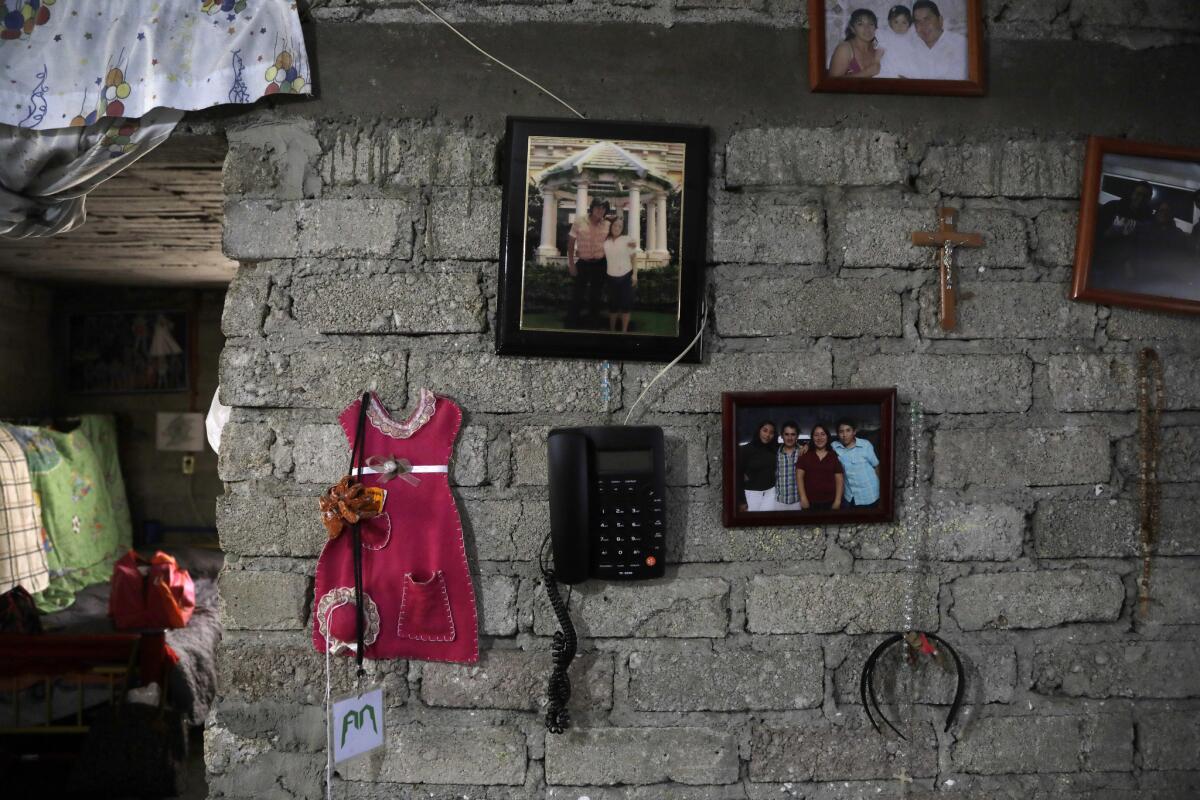
Hernandez played soccer with his boys near a small canal. After coming home late at night from a show with his band, he would break out his guitar and sing the kids to sleep.
In other ways, though, he wasnât a good father. He drank too much beer, usually Corona, sometimes getting so sloppy that he could barely get through band practice.
Hernandez was struggling to make ends meet working at a car dealership and was increasingly drinking away what little money they had, making it hard to buy groceries, clothes or school supplies. Around this time, a co-worker filled him with stories about making it rich in the United States.
With money tight, Chavez took on her first job cleaning houses.
Then one day in 1989, Chavez got a call from her sister saying Hernandez had left a letter for her at the sisterâs house. In retrospect, the family believes he was too scared to deliver the news in person: He had left for the U.S.
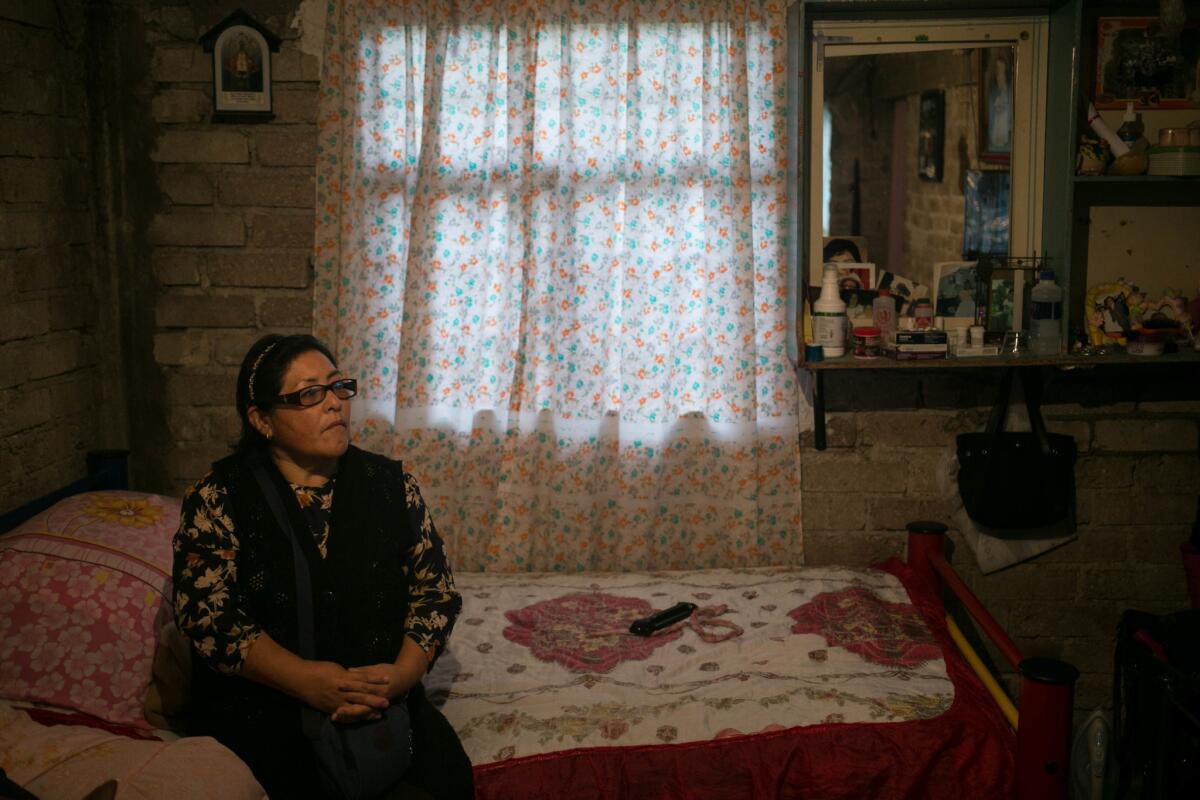
Everything will be different, he wrote. He promised to send money so she and the children could build themselves a nicer house.
But Hernandez also wrote that his wife didnât understand him â that they fought too much. He said he was leaving to do something more with his life.
When he left, Ivonne was 10, Hugo was 6 and Alfredo 4. But the children never lacked a father figure. Some 100 members of their motherâs extended family live on a hilltop they jokingly call the Chavez Colony on the outskirts of Nicolas Romero. Their grandfather Braulio taught them respect and discipline. Their favorite uncle, ToĂąo, showed them generosity and showered them with affection.
Surrounded by family, Chavez and the kids often lived happily. But Hernandezâs calls home were infrequent, as were the checks he promised.
When Ivonne turned 15, Chavez asked him to pay for the quinceaĂąera celebration. Find the money somehow, he told her, and Iâll send some later. He never did.
When a hailstorm caved in their roof and flooded the house, Hernandez promised to send money soon. Chavez and the kids stayed with her parents for almost two months until they could save enough for the repairs. They didnât hear back from him for a year.
Hernandez returned to Mexico for a few months in 1995 and, for the last time, in 2008. He showed up unannounced and lingered at the threshold of the door. The first time, he asked Chavez whether she was going to kick him out. The second time, he walked in behind his sister as if hiding.
During these visits, the children tried to rebuild a relationship with their father. Theyâd play music together or catch movies at the local theater. But it felt mostly superficial. They barely knew him.
During his last visit, he stayed just eight months before deciding again that he was fed up with life in Mexico. He couldnât stand the house, its lack of insulation, primitive flush toilets and unreliable electricity. But a few months after he crossed the border in 2008, he stopped calling.
Rumors circulated their small community: Maybe he had become a narco and ended up in prison. Or maybe he had made a new family and forgotten about his old one.
In reality, Hernandez toiled for years in Los Angeles clothing factories. When those jobs dried up, he found work as a handyman.
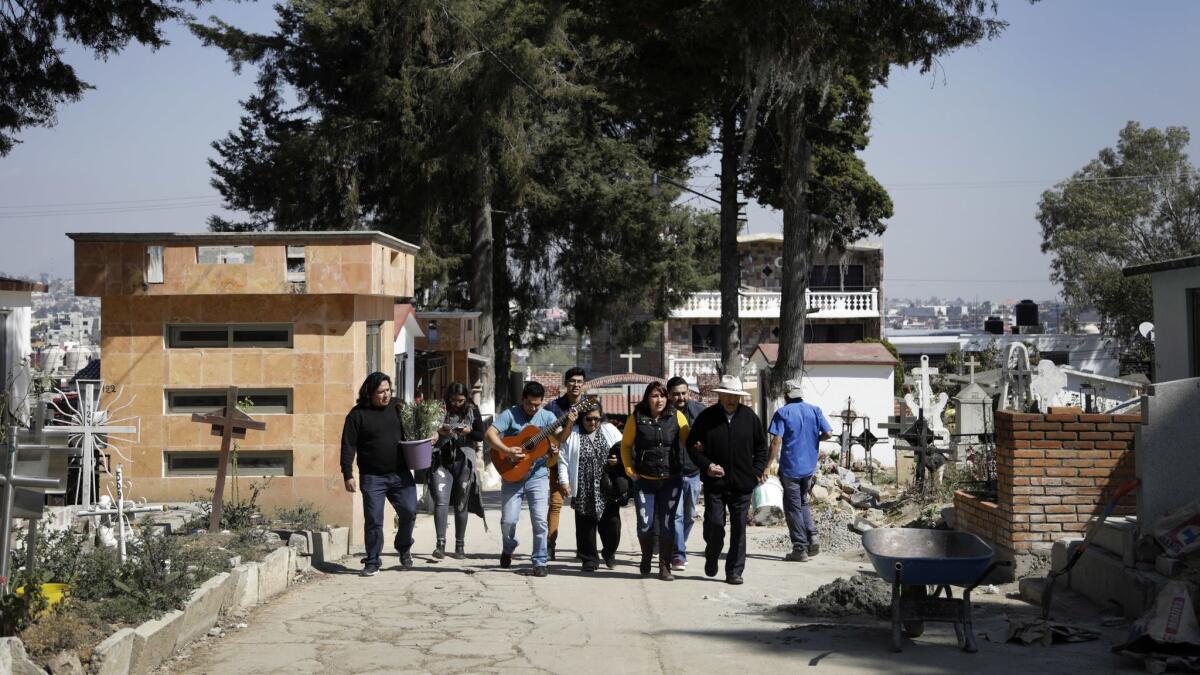
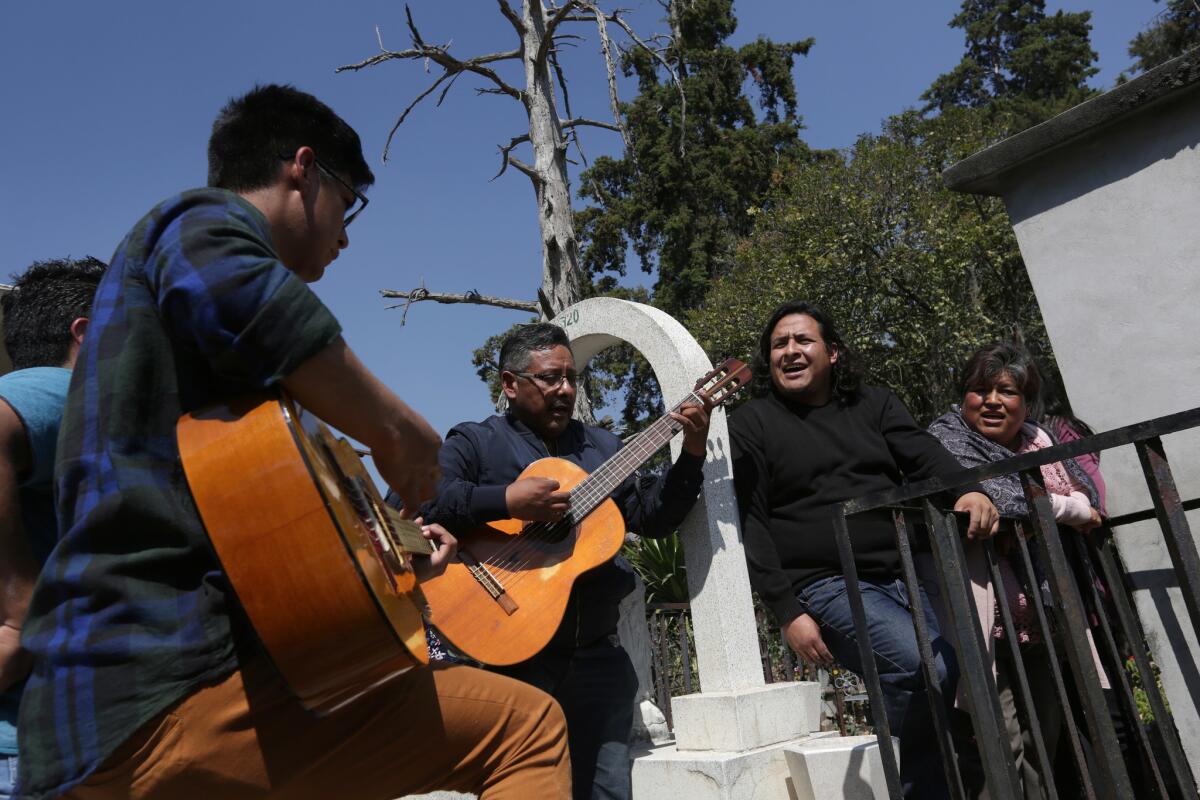
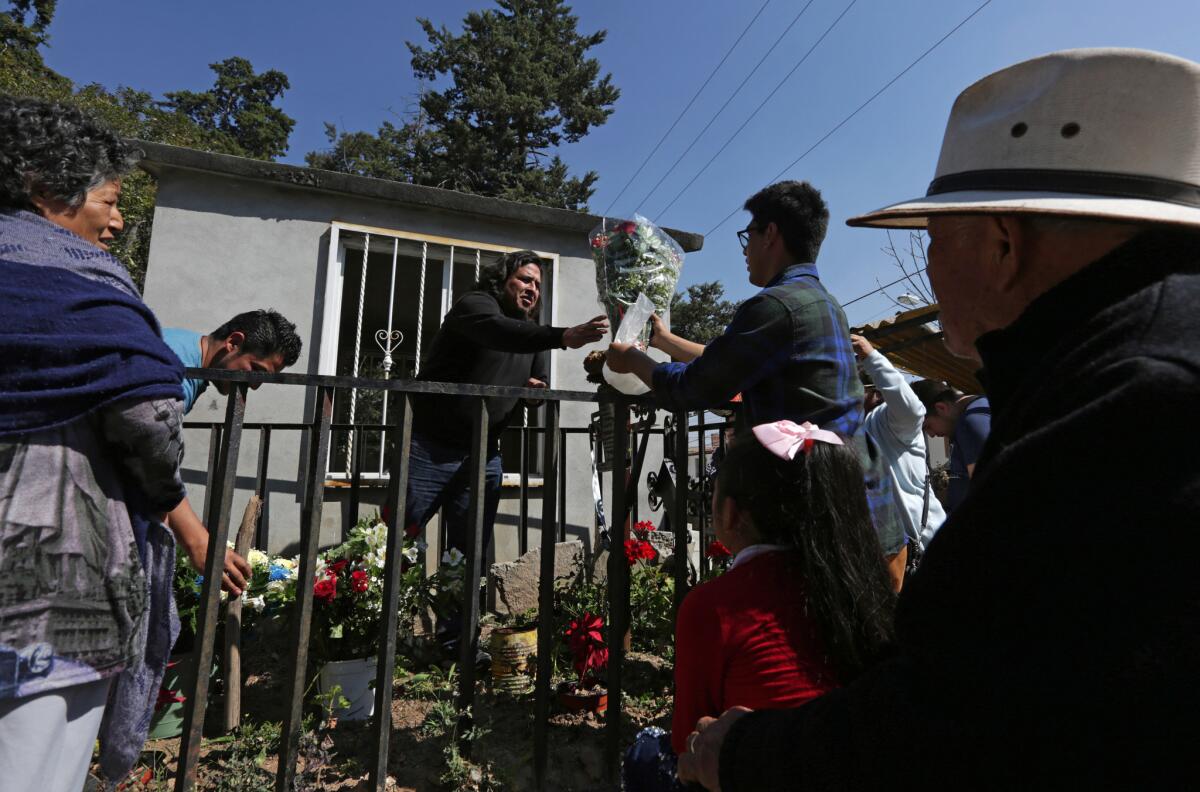
As Hernandez lay dying in Pasadena, he had gone a decade without speaking to his family.
He was in the U.S. without legal status, and the tightening of border security in recent years had made it harder for immigrants to cross illegally between the two countries. Thereâs no indication he ever tried to return to his family, though Hernandez spoke vaguely to friends about searching for them on Facebook.
Luis Valentan got to know Hernandez as director of the Pasadena Community Job Center, run by the National Day Laborer Organizing Network. He said Hernandez suffered from depression and that he was ashamed to face his family penniless and defeated.
Hernandezâs health problems started with stomach pain. Shortly before Christmas in 2017, he complained to friends that he was having trouble eating. He had resisted going to the doctor, not only because he didnât have medical insurance, but because he feared immigration authorities would find him and deport him.
When Valentan visited Hernandez at his apartment a week later, his eyes looked yellowish and he had lost significant weight. He told Valentan he wasnât sure heâd live to see the new year.
Three thousand miles away, Hernandezâs daughter was having repeated dreams about him. She canât recall exactly what happened in these dreams, but she told her mother that they felt like a premonition. âThe day my dad turns up,â Ivonne said, âitâll be because we find out that heâs dead or sick.â
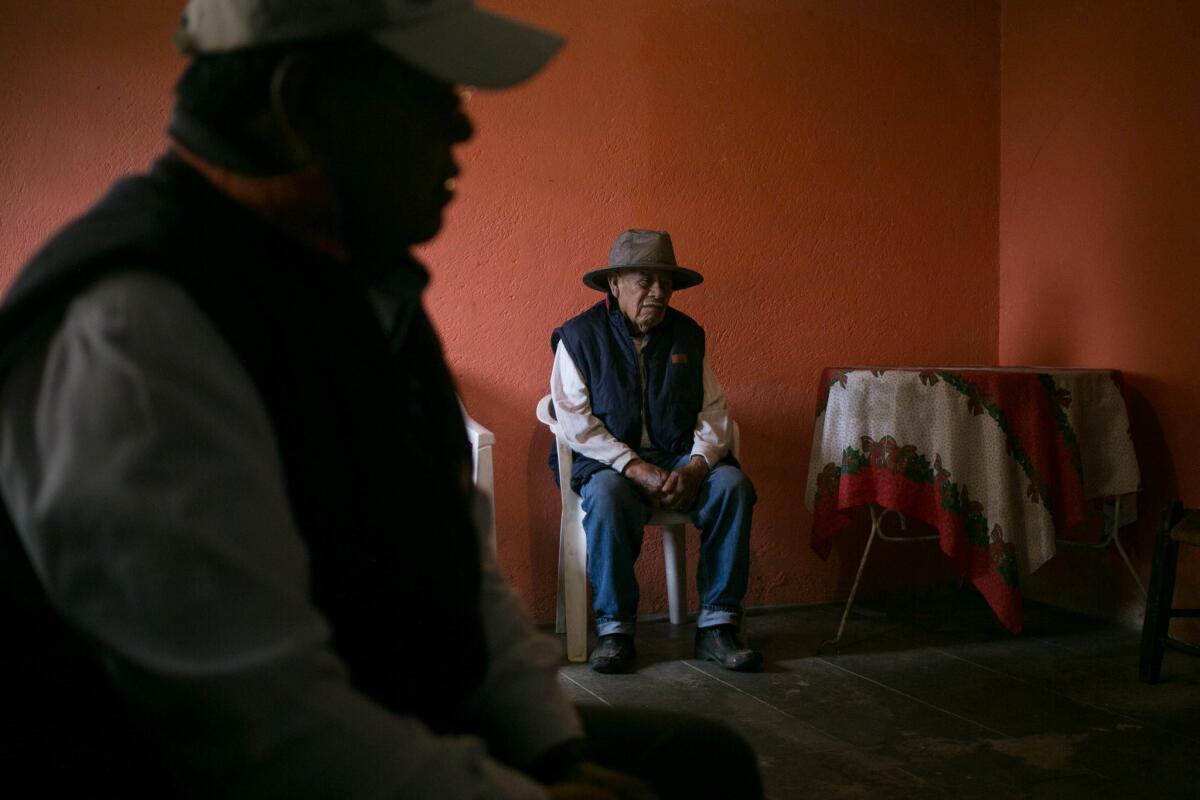
That same December, Hernandezâs mother died. For years, his sister Maria had lied and told their mother that he had moved to Chicago and was doing fine. But after more time passed and he still hadnât called, the lie became too difficult to keep up. Maria finally admitted to their ailing mother she hadnât heard from her brother since before he crossed the border into the U.S. The old woman died never knowing what had happened to her son.
By the end of January 2018, Hernandez was in the hospital, his only visitors other day laborers. They played guitar for him, sometimes with 15 of them squeezed into the room. The final song he had enough strength to sing, a duet with his nurse on vocals, was the famous Mexican bolero, âBĂŠsame Mucho.â
Kiss me
Kiss me a lot
As if tonight were the last time
When doctors told Hernandez the cancer was terminal â it had spread to his intestines, lungs and kidneys â he asked Valentan for help finding his family. They spent days scrolling through thousands of Hugo and Alfredo Hernandezes on Facebook.
But as Hernandezâs condition worsened, he started losing his eyesight. Valentan needed a new plan. He put out a Facebook blast, asking friends to share Hernandezâs story in hopes that it would reach his children. Nothing.
âWe started to give up,â Valentan said.
Then Valentanâs cousin, a police officer in Mexico City, saw the post. He asked Valentan for the names of Hernandezâs wife and children, their birth dates and hometown. He found their address, but no phone number, using a police database.
The cousin persuaded the civil protection agency to deliver the news to Hernandezâs family that day. Four days later, Hernandezâs wife and two sons flew to Tijuana with tickets purchased with about $2,000 of borrowed money.
Mexican citizens in the U.S. often ask the Mexican Consulate for help reuniting with family, said Felipe Carrera, who oversees the consulateâs department of protection in Los Angeles.
For those with advanced illnesses, such as Hernandez, the consulate can help family members in Mexico secure visas quickly for a final reunion.
âWe do what we can to find people,â Carrera said.
After Hernandez reconnected by phone with Chavez and the children, word quickly spread to the rest of his family. In a phone conversation, his sister Maria, whom he had lived with in Tijuana before making his last trek into California, asked why he never contacted them.
âIâm sorry,â he told her. âI lost my address book.â
Hernandez was the oldest of nine children, and his siblings were devastated that they hadnât been able to reconnect sooner. But an uncle, whose brother had gone to the U.S. in the 1960s and never come back, gave them perspective. âAt least you know where your brother is,â he told them. âI looked for many years and was never able to find mine.â
Chavez, Hugo and Alfredo arrived at the border in Mexicali at 3 p.m. on Feb. 10 with letters from the hospital and the Pasadena job center, as well as their birth certificates. Ivonne, 39, couldnât get the time off work and was devastated that she didnât get to go. Edgar, 18, Chavezâs youngest son from a different relationship but who considered Hernandez his father, also stayed behind.
Close to 1 a.m. the next day, an agent granted them humanitarian parole to enter the U.S. for one week.
Meanwhile, Valentan remained with Hernandez, who appeared to be in more pain every hour. Valentan told him his family was driving up from the border. Wait for them, he said.
By the time they reached Hernandez, it was 5 a.m. and he could barely speak. His wife and sons circled his hospital bed, patting his arm and stroking his cheek.
His last word was a weak request. âPerdĂłname,â he begged them. Forgive me.
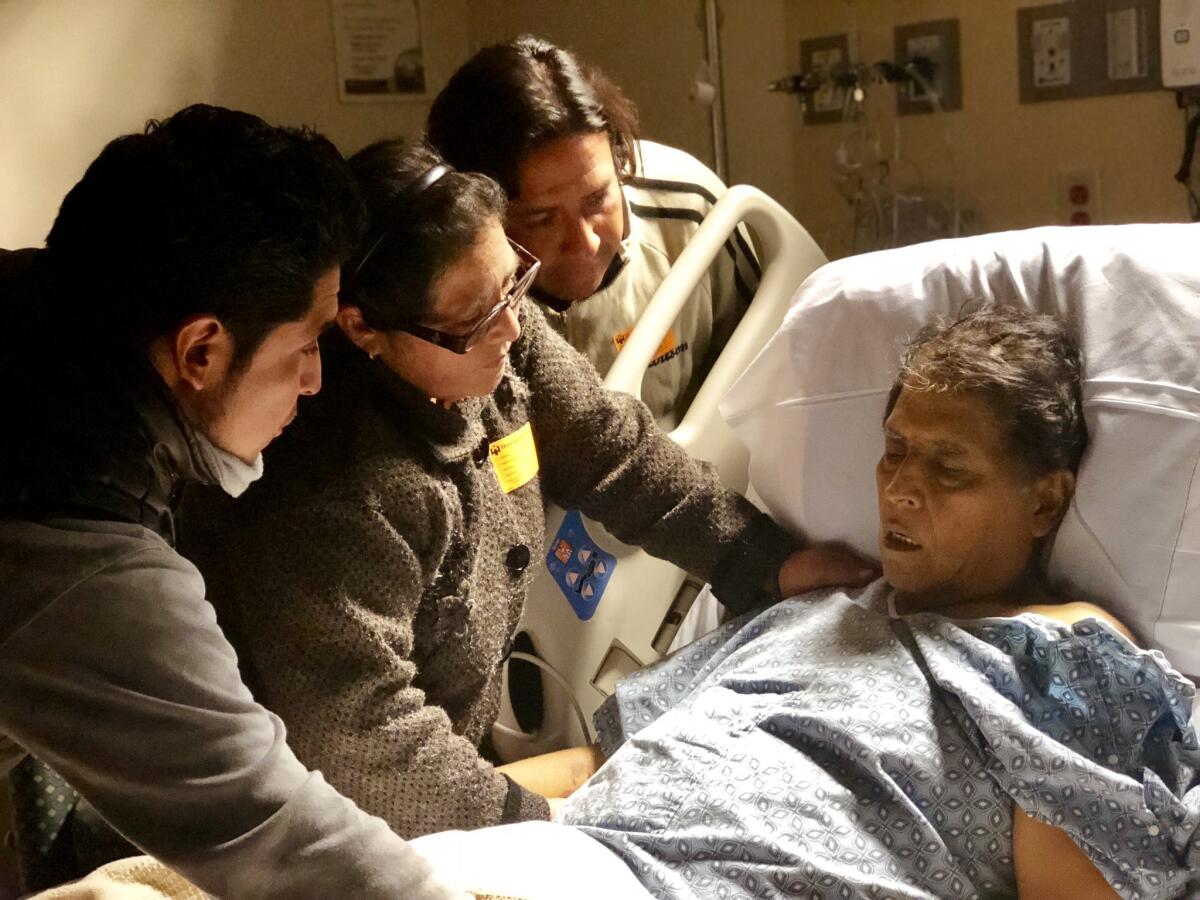
They hadnât come to judge him. Chavez, despite the resentment sheâd harbored against him for leaving her a single mother, had always told her children to focus on the good.
âWeâre here now, Pa. We arrived,â said his youngest son, 33-year-old Alfredo.
âLet God rid you of this pain, this anguish,â Chavez said. âYou will be fine now. Relax, Eduardo.â
Hernandez could barely open his eyes, but he weakly lifted his arms to hug his wife and sons.
Hugo, 35, and Alfredo spent the day playing guitar and singing Mexican ballads to their father, just as he sang them to sleep when they were boys.
Close to 10:30 p.m., they video-called Chavezâs brother Alvaro in Mexico. Hernandez had taught him to play guitar as a teenager, and Alvaro had in turn taught Hernandezâs children. Alvaro began playing one of the first songs Hernandez ever showed him.
Hernandez weakly lifted his head and opened his eyes. Unable to speak, he mouthed along as Alvaro sang âTu Inolvidable Sonrisaâ â âYour Unforgettable Smile.â
Iâll forget all the good.
The bad Iâll forget quickly.
Iâll forget so many things
But never your smile.
Alfredo was the last one awake shortly after midnight when he heard his father gasp. He called for a nurse, then rubbed his fatherâs chest. He had stopped breathing.
The following day, the family visited the dilapidated two-bedroom apartment Hernandez had shared with two other men. Its walls were faded and yellow, with tar-like grease stains behind an old stove top and a ceiling riddled with holes and exposed electrical wires. He had slept on a discolored mattress in the corner of a cramped living room.
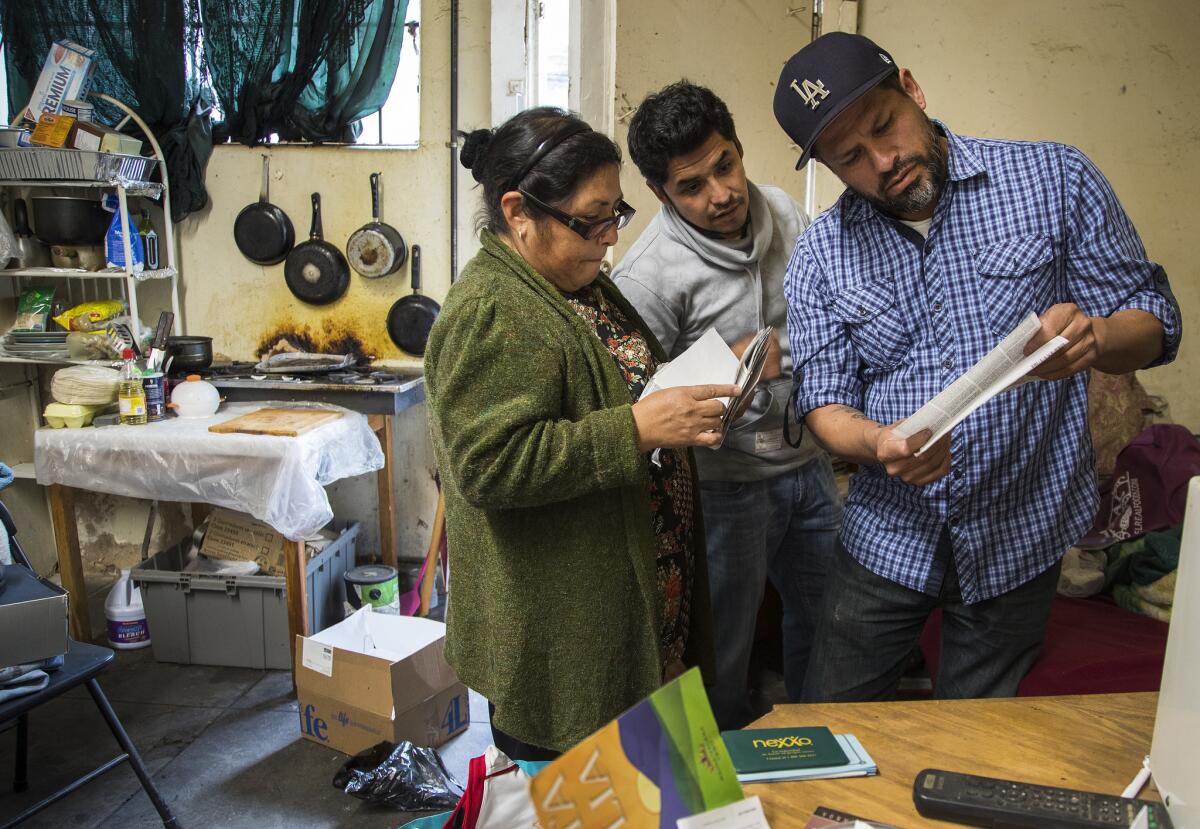
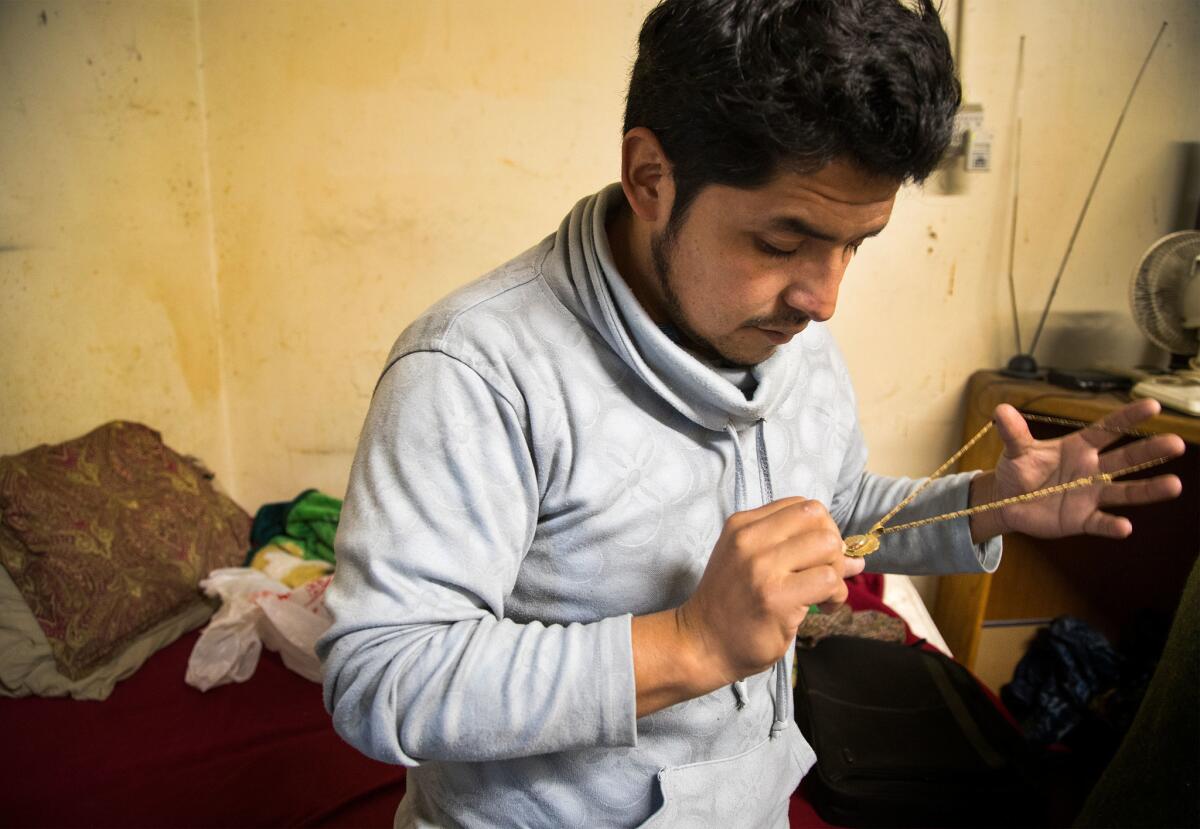
They finally understood why Hernandez hadnât offered more details about his life, why heâd made so many promises he never kept.
âMy home is ugly,â Chavez said. âBut itâs not like this.â
It was their first real insight into his years in the U.S. He was just a man without much to show for his life.
Alfredo smiled at his fatherâs paint-stained brown leather work boots. Hugo laughed reading the title of a book, âEnglish in 20 lessons.â
They sifted through what theyâd keep and toss. A near-full box of Amway business cards. A detox and healthy living plan. A pocket-sized copy of the New Testament. A toy car â âFor your son,â Chavez told Alfredo. A pendant with an image of the Virgin of Guadalupe.
Chavez picked up a plastic bag of medications near his bed: Pepto-Bismol, dietary supplements, digestive enzymes, heartburn relief.
âHe was self-medicating,â Valentan said.
From a small wheeled clothes rack, Hugo picked out a light-blue button-up shirt, a black pinstripe jacket and black slacks. After all those years apart, his final resting place would be back in Mexico, at last with his family.
Behind the story: A dying immigrantâs quest to reunite with his estranged family Âť
After church on an overcast late Sunday morning in May, a dozen family members drove to the cemetery in Nicolas Romero. Stopping at a flower shop across the street, Chavez bought two large bouquets of roses and lilies for 350 pesos, about $20.
They walked past rows of graves before stopping at a small plot crammed tightly between ornate tombs and a mausoleum. It was bordered by a black metal gate, the dirt packed into a rounded mound. The family had dug it themselves.
The grave marker, with loopy white script on a metal cross, said Hernandez was âremembered by his wife, children, family and friends.â
Forming a semicircle with aunts, uncles and cousins, Hugo sang lead while his siblings played their fatherâs two plain Fender guitars that they had brought back from Pasadena.
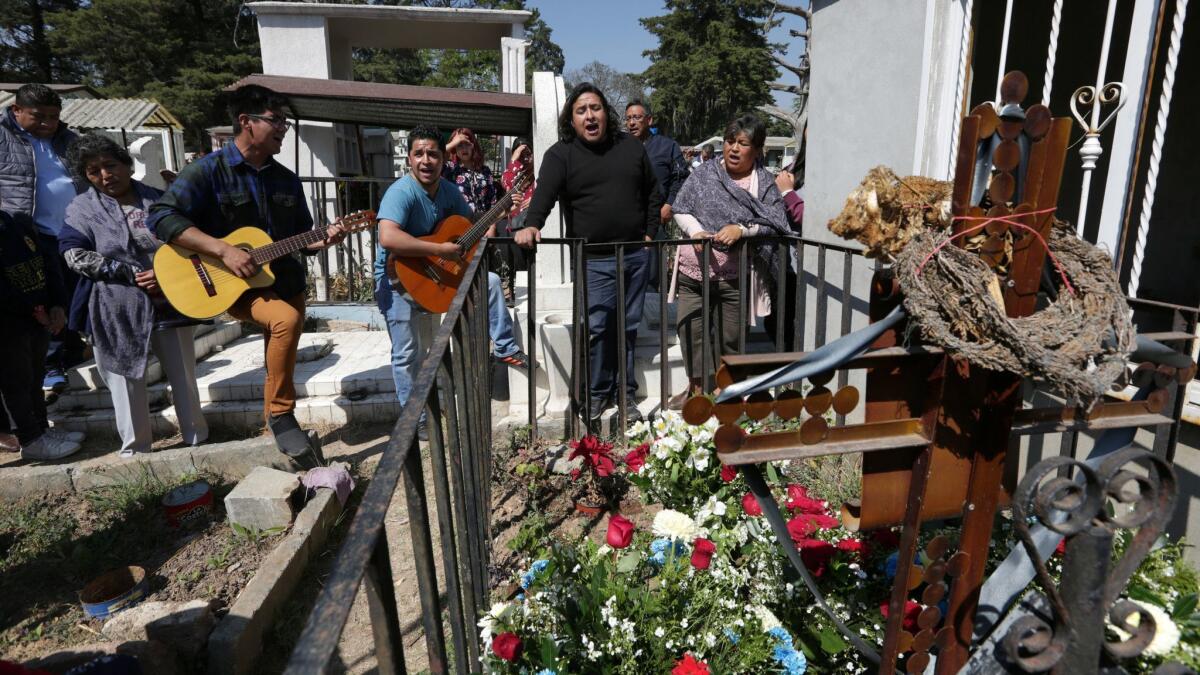
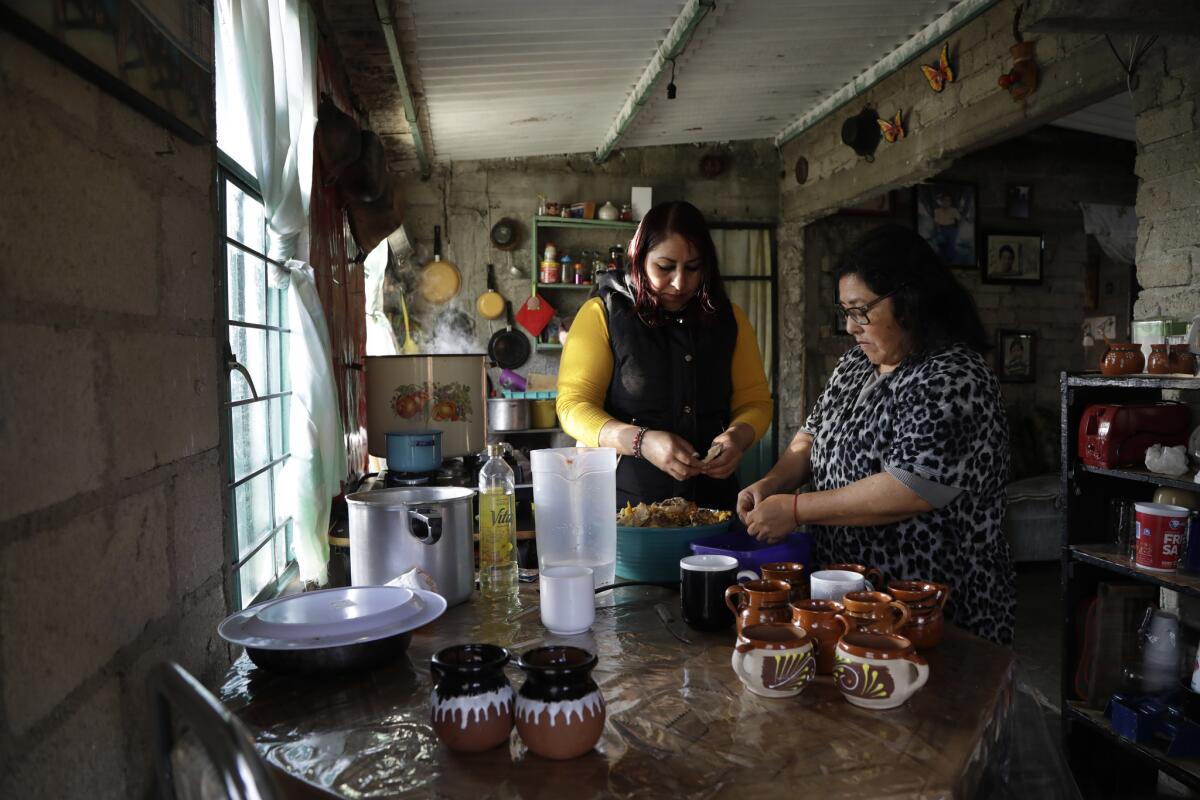
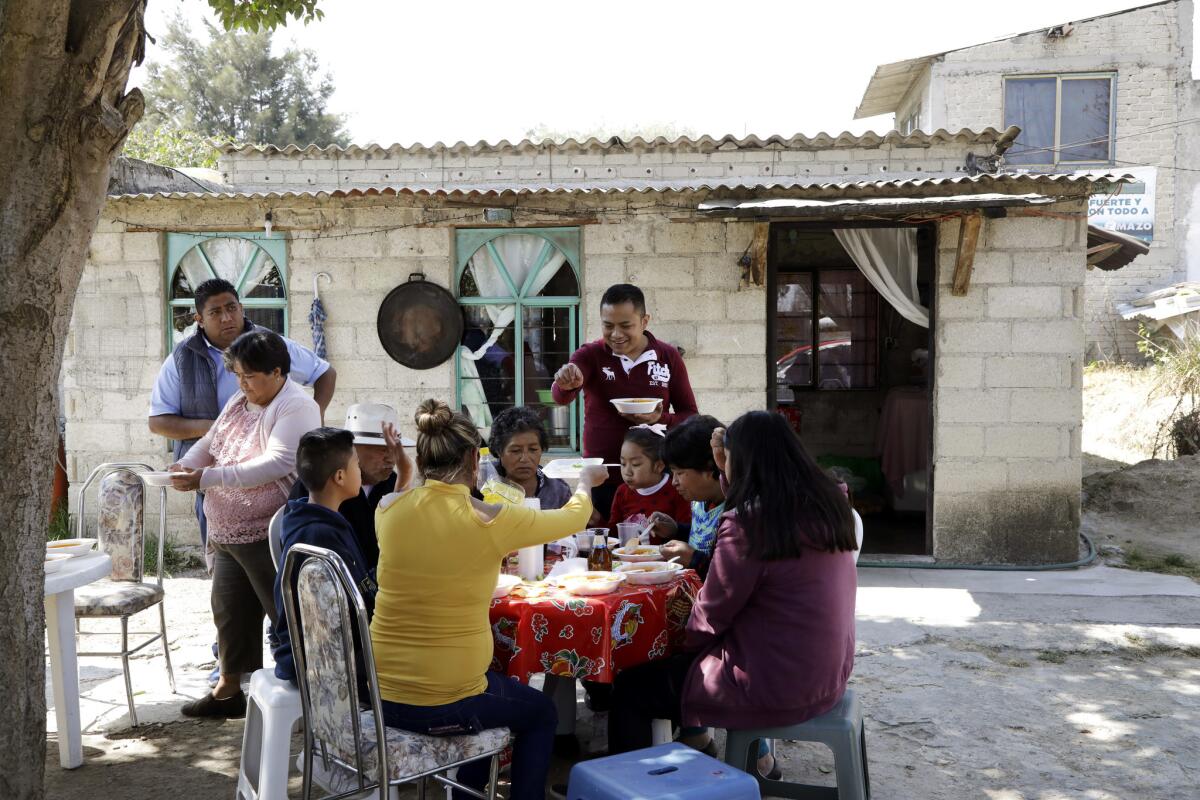
In the year since, the family has continued to gather at his grave every month to sing for him. A large group assembled in early February, around the first anniversary of his death. They serenaded the man theyâd come to know better in death than in life with a ballad that could have been written for him. Itâs called âEl Andariegoâ â âThe Wanderer.â
There are absences that triumph
And ours triumphed.
Let us love now with the peace
That we had previously missed.
And when I die, let there be neither light nor crying,
No mourning or anything else.
There by my cross, I only want peace.
Sign up for Essential California
The most important California stories and recommendations in your inbox every morning.
You may occasionally receive promotional content from the Los Angeles Times.








